Enjoy a Complete Smile Again

After losing any number of teeth, it won’t be long before you realize just how important a complete smile is for everyday tasks like speaking and chewing. At Waban Dental Group, our team of dental experts – which includes a prosthodontist and a periodontist – can help you fill in the gaps in your grin with long-lasting, natural-looking dental implants. Give us a call today if you’re interested in learning more about dental implants in Newton and the many advantages they offer!
Why Choose Waban Dental Group for Dental Implants?
- Start-to-Finish Dental Implant Procedures
- In-Office Prosthodontist and Periodontist
- 40+ Years of Improving Smiles
What Are Dental Implants?
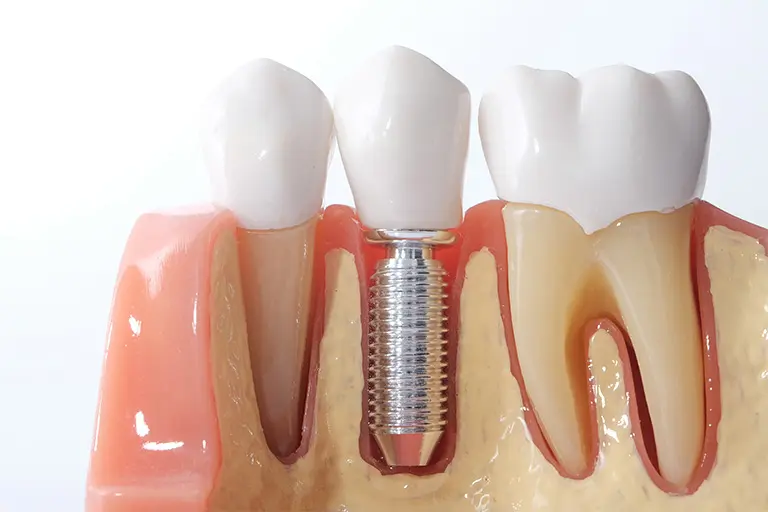
By itself, a dental implant looks more like a screw than a tooth. But once it has been placed in the jaw and allowed to form a bond with the surrounding bone, it can act as an artificial root for a lifelike crown, bridge, or denture. Dental implants are often seen as the modern gold standard of tooth-replacement options thanks to the many benefits they provide, such as enhanced chewing power and stability.
The 4-Step Dental Implant Process

Dental implants are quickly becoming one of the most popular tooth replacement options, offering incredible stability and a natural feel that can’t be matched. At Waban Dental Group, we complete the entire implant process in-house from placement to final restoration, ensuring precision and comfort every step of the way. But how do we create flawless implant restorations every time?
There’s a four-step process that is carefully planned and executed for each and every patient, creating a long-lasting, functional smile. While the procedure takes time, the results are well worth it! Read more below to learn what you can expect during your dental implant treatment.
Initial Dental Implant Consultation

The process begins with a consultation consisting of a thorough oral exam and extensive planning. During this visit, we:
- Examine your teeth, gums, and jawbone with digital X-rays.
- Discuss your medical history and any risk factors due to lifestyle habits, genetics, or medication.
- Create a customized treatment plan that takes all these factors into account.
Careful planning is what makes dental implants so successful, so if we find any roadblocks based on our findings, we’ll address them before your treatment begins. For example, if your jawbone has deteriorated due to tooth loss, we may recommend a bone graft before implant placement. Once we finalize the plan, we’ll schedule your implant surgery.
Dental Implant Surgery
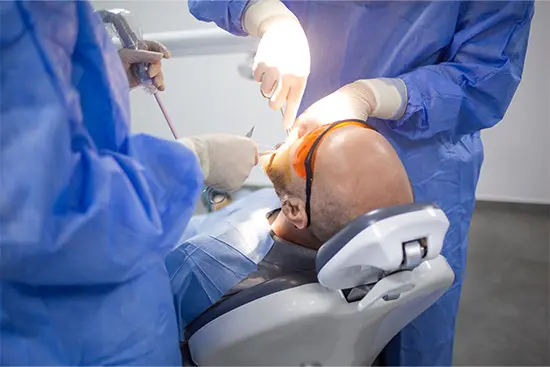
While many dental practices rely on outside specialists to perform implant surgery, at our Newton practice, we do every placement entirely in-house. This is not only more convenient but also saves you money by encapsulating every aspect of the process under one roof. Here's what you can expect during implant surgery:
- First, the implant site is numbed with local anesthesia for a pain-free experience.
- Next, a small incision is created in your gums to access the underlying jawbone.
- Then, a screw-like implant fixture is strategically placed into the implant site.
- Finally, the gum tissue around the fixture is sutured to protect the implant and begin the healing process.
Thanks to our expertise and technology, the procedure is minimally invasive, with most patients experiencing little to no downtime.
Dental Implant Osseointegration & Abutment Placement

Waiting is always the hardest part, but once you’ve entered the healing phase, you’re almost there! Over the next three to six months, your implant will undergo a process known as osseointegration, where the bone fuses with the titanium post. This creates a stable foundation for your new restoration, whether it’s a crown, a bridge, or a denture.
Once healing is complete, we perform a minor procedure to attach the abutment (a small connector) to the implant fixture. Then, we take impressions that are sent to a partnered dental lab so they can craft your custom restoration. After another two weeks to a month of healing time, you’re ready for the final step!
Delivery of Dental Implant Restorations

At last, it’s time to attach your new restoration. During your visit, we’ll secure your prosthetic to the abutment and make any final adjustments to ensure a great fit and natural bite.
Once complete, you’ll walk out with a fully restored, functional restoration that looks and feels just like the real thing. And, with proper care, your dental implant can last a lifetime!
Benefits of Dental Implants

Dental implants are the gold standard for replacing missing teeth, offering excellent durability, function, and aesthetics. Unlike traditional restoration methods like dentures or bridges, implants fuse with your jawbone, creating a strong anchor point for prosthetic teeth. At Waban Dental Group, we recommend implants for our patients because of the numerous benefits they offer. Whether you’re missing one tooth or several, this long-term solution helps you eat, speak, and smile with ease. But how transformative are dental implants, really? Read more below to see the many ways they can improve your life.
Day-to-Day Benefits

Dental implants are incredible in the way they feel and function just like natural teeth. With this level of stability and comfort, you’ll see many small day-to-day benefits right away. Implants can allow you to:
- Eat All Your Favorite Foods: Enjoy any meal you’d like without restrictions.
- Speak Clearly: No more slipping prosthetics, discomfort, or speech impediments due to missing teeth.
- Smile with Confidence: Implants are beautiful and blend seamlessly with your natural teeth.
- Avoid Added Maintenance: No more hassle with adhesives or special cleaning solutions, just brush and floss your teeth like normal.
At our Newton dental office, we ensure your implants reflect your true smile so you can enjoy a worry-free and confident grin every day.
Health Benefits

Beyond aesthetics and daily convenience, dental implants also offer multiple health benefits, including:
- Jawbone Preservation: Implants stimulate jawbone growth like natural tooth roots, preventing bone loss that occurs with missing teeth.
- Tooth Structure Stability: Unlike bridges, implants don’t rely on reducing adjacent teeth, reducing strain and preserving their strength.
- Lower Risk of Decay & Infection: A complete smile eliminates food traps that can harbor bacteria and cause oral health issues like cavities and gum disease.
- Improved Digestion: Implants restore 70 percent or more of your bite force, improving your ability to chew and digest food.
Long-Term Benefits

Dental implants are built to stand the test of time, making them a smart long-term investment. With proper care, they can last for decades, or even a lifetime, offering:
- Cost-Effectiveness: While the initial cost of implants is higher, they don’t wear out easily, eliminating the need for ongoing adjustments or replacements.
- Permanent Stability: Dental implants have a success rate of over 95 percent, meaning you’ll enjoy their benefits for many, many years.
- A More Youthful Appearance: After tooth loss, your jawbone will begin to deteriorate over time, creating a sunken or hollow appearance. Dental implants prevent this, allowing you to stay looking younger, longer.
Dental implants aren’t just about replacing teeth—they’re about restoring confidence, health, and peace of mind. If you're ready to experience a healthy, lasting smile reach out to us today and schedule your consultation.
Who Dental Implants Can Help

If you have one or more missing teeth, you may qualify for dental implants if you meet the following criteria:
- You don’t have any health issues that would stop you from having minor surgery performed.
- You are in good oral health overall, meaning you have no cavities or gum disease.
- You have enough bone in your jaw to have dental implants placed.
Note that some patients may need to complete preparatory treatments in order to fulfill the criteria listed above. If you are a dental implant candidate, you can get implant posts to address the following tooth loss situations.
Missing One Tooth
A single gap in your smile may not seem like a big deal, but it can lead to more serious oral health issues later. Our team can fill in the gap with a dental implant post and a crown made out of natural-looking materials.
Missing Multiple Teeth
When three or more teeth in a row are missing, a dental bridge and a pair of dental implants can be used to replace them all at once. Also, a partial denture can be combined with a strategic number of implant posts in order to replace any teeth that were lost throughout your mouth.
Missing All Teeth
The idea of replacing all of your teeth with dental implants may seem daunting, but oftentimes, only four to six implant posts are needed to support a full denture. Thanks to the stability of the implant posts, implant dentures don’t slip the way that traditional dentures sometimes do.
Understanding the Cost of Dental Implants

Our team can explain the various factors that can affect the cost of dental implants, such as the surgery itself, the number of implants needed, the materials used, and any required preliminary work. While dental implants tend to cost more than traditional bridges and dentures, they also don’t need to be replaced as often, and you don’t need to invest in any special cleaning solutions to take care of them. In the long term, they’re an excellent investment in your quality of life and may even help you save money!
Preliminary Treatments & Implant Surgery
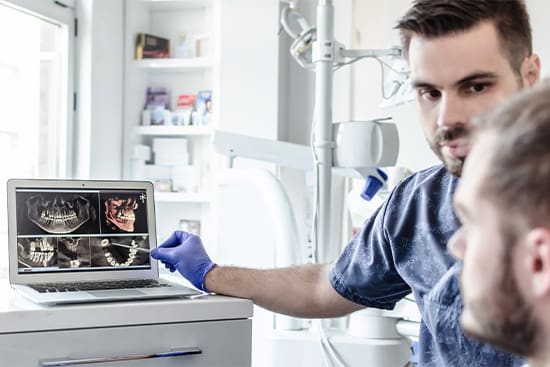
Have you been dealing with tooth loss for a while, or did you invest in a traditional prosthetic like a dental bridge before turning to dental implants? These are two situations in which you may require a preliminary treatment before you can successfully undergo dental implant surgery. This is because over time, your jawbone will erode due to a lack of stimulation, requiring you to need a procedure called a bone graft. Or, due to your anatomical makeup, you may find that you need a sinus lift. These procedures all incur separate costs.
In addition to the need for preliminary treatment, another added cost of dental implants in Newton is your surgery. A great benefit of visiting Waban Dental Group is that you can receive your implant placement in-house from our periodontist, meaning you won’t have to pay higher fees by going to a different provider for this part of your procedure.
The Parts of Your Dental Implant
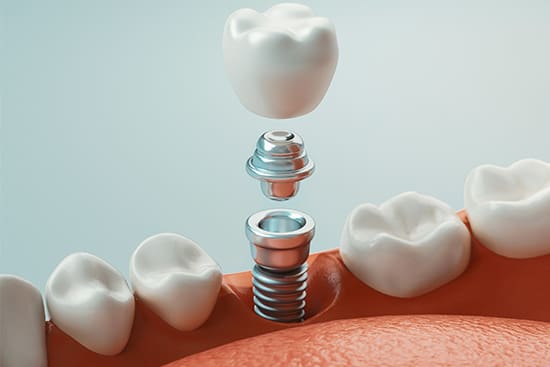
Some additional factors that may play a role in your dental implant procedure cost include:
- How many dental implants you need to have placed.
- What type of restoration you require.
- The materials your implants are crafted from.
- The manufacturer of your dental implants.
Our team at Waban Dental Group utilizes high-quality materials that are built to stand the test of time, allowing you to get lasting results with fair fees.
A Long-Term Investment That Pays Off

One of the greatest money-saving benefits of getting dental implants is the fact that they can last for up to 30 years or longer. This means that you will spend less time in the treatment chair in addition to having fewer costly procedures. In the end, this benefit alone makes dental implants worth the long-term investment as opposed to traditional dentures, which last an average of five to seven years before needing to be replaced.
Does Dental Insurance Cover Dental Implants?

Our office is happy to help maximize your dental insurance benefits whenever they’re applicable, and we’re in-network with Delta Dental Premier. However, in many cases, insurance plans don’t cover the cost of dental implants. Before you move forward with treatment, our team would be happy to conduct a benefits check for you so you can better understand what your out-of-pocket costs will look like.
Dental Implant Post-Op Instructions

Following dental implant surgery at Waban Dental Group, it’s important to take care of yourself to facilitate a smooth and successful recovery. From managing discomfort to maintaining good oral hygiene, sticking to these guidelines will help protect your investment and set you up for success. Read more below to see important information about every step of the recovery process and find detailed instructions to support healing.
What to Do Directly After Dental Implant Surgery

In the first 24 hours after surgery are critical to the rest of your recovery, so it’s best to focus on rest and minimizing activity. Here are some simple ways to ensure your first day goes well:
- To control any bleeding, gently bite on gauze pads and change them as needed.
- Apply a cold compress in 15-minute intervals to reduce swelling.
- Avoid spitting, rinsing, or drinking through a straw, as this can disturb the surgical site.
- Take prescribed medications as directed, and elevate your head when lying down.
Common Side Effects When Recovering from Dental Implant Placement

Minor side effects are common during the first few days after dental implant surgery. These may normally include:
- Swelling around your cheeks or jaw
- Bruising near the surgical site
- Mild bleeding or oozing
- Discomfort when chewing or speaking
If you’re suffering from any of these symptoms, don’t panic. It’s completely normal and should improve within a week. However, if they worsen or persist for more than a couple of days, give us a call. We’ll offer guidance or schedule a follow-up appointment to make sure everything is going smoothly.
Your Diet After Dental Implant Surgery

Your implant will be vulnerable to excessive pressure for a few days after your procedure, so stock up on soft, bland, lukewarm foods. Avoid anything crunchy, spicy, or hot that might irritate the site. Great options include:
- Yogurt
- Mashed potatoes
- Applesauce
- Warm soup
- Smoothies (no straws!)
- Scrambled eggs
- Oatmeal
As your comfort improves, you can gradually reintroduce firmer foods. We’ll let you know when it’s safe to return to your normal diet.
Post-Op Health & Oral Hygiene

Keeping your mouth clean is absolutely key to avoiding infection. Start brushing gently near the implant site the next day, avoiding direct contact with any part of it. You can also use a saltwater rinse (not mouthwash) after meals to keep the area clean. Just be sure to swish gently and let the water fall from your mouth, don’t spit!
What to Do After Your New Teeth Are Attached

Once your permanent crown, bridge, or denture is placed, you’re all done! Treat your restoration like a natural tooth in every way by brushing twice daily, flossing, and visiting our Newton dental office for regular checkups.
Now that your implant is complete, it’s time to enjoy life and reap the rewards of your patience. With the right care, your implant can last for decades!
Caring for Your Dental Implants

Dental implants are a big investment, and our team at Waban Dental Group wants to make sure you’re able to enjoy your results to the fullest. That’s why we’ve outlined some helpful maintenance practices for keeping your dental implants in Waban healthy and functional. If you have any questions or concerns following your treatment, please don’t hesitate to reach out to our friendly team.
Prioritize Oral Hygiene

Just like with your natural teeth, it’s crucial to have good oral hygiene practices to keep your dental implants healthy. Although your restorations can’t get cavities, gum infections can still develop due to poor oral hygiene that will put you at risk of dental implant failure. Be sure to brush your teeth twice a day for two minutes, floss between your restorations and natural teeth, and rinse with mouthwash once a day. This should help prevent plaque and tartar build-up in the mouth.
Eat a Balanced Diet

Did you know that what you eat can affect your oral health? Frequently consuming foods that are high in carbohydrates, like potato chips and cookies, can create a buffet for harmful oral bacteria to help themselves. Try balancing your diet by substituting fresh fruits and vegetables for carb-heavy snacks every once in awhile to reduce your risk of peri-implantitis.
Break Bad Oral Habits

If you find yourself chewing on your fingernails when you’re nervous or using your teeth to open packages, you’ll want to put effort into breaking these habits before getting dental implants. When left unchecked, these harmful oral habits can compromise the function and stability of your new replacement teeth.
Protect Your Dental Implants
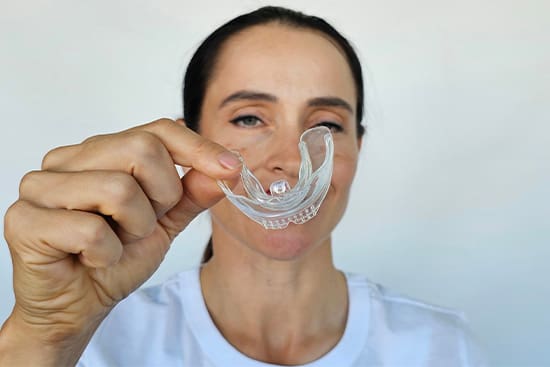
If you grind your teeth at night, our team recommends investing in a customized nightguard and putting an end to these bad oral habits. Our customized nightguards act as a cushioning layer between your arches of teeth, preventing tension and force from causing a dental implant to become loose or damaging a restoration.
Schedule Routine Checkups & Cleanings

To prevent tartar accumulation and ensure your dental implants are healthy and functional, it’s important to visit our team at Waban Dental Group every six months for checkups and cleanings. Not only will one of our skilled dental hygienists thoroughly clear away all plaque and tartar from the surface of your teeth, but one of our knowledgeable dentists will also check to make sure none of your implants are loose or damaged. With these regular appointments, you can rest assured knowing that your smile is healthy until the next time you see us!
Dental Implant FAQs
Do Dental Implants Feel Natural?
Dental implants are often described as being the next best thing to natural teeth. They are designed to function, feel, and look as natural as possible. Once your implants successfully bond with your jawbone and your new restorations are set in place, they should very quickly start to feel normal and comfortable in your mouth.
Of course, it is important to remember that dental implants do not have nerve endings like natural teeth. Therefore, you should not expect the same hot/cold sensations from them that you experience with natural dentition.
Do Dental Implants Decay?
Dental implants are made of titanium alloy, and the artificial teeth on top of them are usually made of porcelain. These materials do not decay like natural tooth enamel. They are invulnerable to cavities!
With that being said, it is important to note that the tissue around dental implants remains vulnerable to harm. An overabundance of oral bacteria could cause a dangerous infection in your gum tissue that might eventually lead to dental implant failure. That is why dental hygiene does not lose any of its importance when you receive artificial teeth.
Is There Anything I Shouldn’t Eat with Dental Implants?
Dental implants can provide a bite force that is almost equal to that of natural teeth. In other words, they are strong enough to stand up to virtually any food, including tough meats, raw veggies, and more.
Of course, reasonableness is still essential. As you are healing from your dental implant surgery, you should eat a soft diet that will not irritate your surgical sites. Even after you have fully healed, you should plan your meals so that you consume lots of nutrient-rich foods that can support your oral and overall health.
How Long Do Dental Implants Last?
The lifespan of dental implants depends on a few factors. Under ideal conditions, they can last an entire lifetime!
To help your dental implants last as long as possible, you should:
- Stick to a good oral hygiene routine.
- Manage your overall health.
- Wear a mouthguard when necessary to reduce the risk of oral injuries.
- Visit our team regularly for cleanings and checkups.
Are Dental Implants Safe?
Dental implants are a very low-risk treatment.
- Implants are usually made of medical-grade titanium alloy, which tends to work well within the human body. Adverse reactions to it are very rare.
- We carefully plan the placement surgery to minimize risks.
- If you take good care of your mouth and overall health, there is a good chance that your implants will be successful and serve you well for many years.
If you have any risk factors that may increase your risk of complications, our team will talk to you about these issues so you can take appropriate action to manage them.





